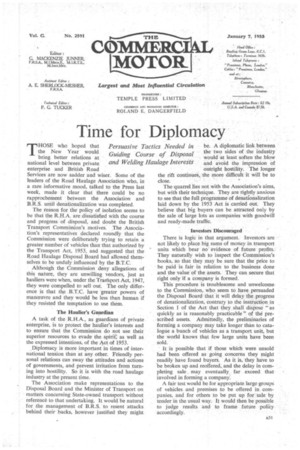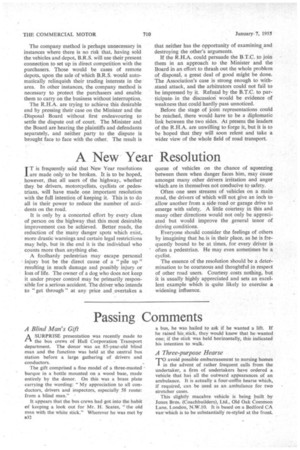Time for Diplomacy
Page 39

Page 40

If you've noticed an error in this article please click here to report it so we can fix it.
THOSE who hoped that the New Year would bring better relations at national level between private enterprise and British Road Services are now sadder and wiser. Some of the leaders of the Road Haulage Association who, in a rare informative mood, talked to the Press last week, made it clear that there could be no rapprochement between the Association and B.R.S. until denationalization was completed.
The reason for the policy of isolation seems to be that the R.H.A. are dissatisfied with the course and progress of disposal, and doubt the British Transport Commission's motives. The Association's representatives declared roundly that the Commission were deliberately trying to retain a greater number of vehicles than that authorized by the Transport Act, 1953, and suggested that the Road Haulage Disposal Board had allowed themselves to be unduly influenced by the B.T.C.
Although the Commission deny allegations of this nature, they are unwilling vendors, just as hauliers were when, under the Trarfsport Act, 1947, they were compelled to sell out. The only difference is that th,e B.T.C. have -greater powers of manceuvre and they would be less than human if they resisted the temptation to use them.
The Haulier's Guardian A task of the R.H.A., as guardians of private enterprise, is to protect the haulier's interests and to ensure that the Commission do not use their superior resources to evade the spirif, as well as the expressed intentions, of the Act of 1953.
.Diplomacy is more important in times of international tension than at any other. Friendly personal relations can sway the attitudes and actions of governments, and prevent irritation from turning into hostility. So it is with the road haulage industry at the present time.
The Association make representations to the Disposal Board and the Minister of Transport on matters concerning State-owned transport without reference to that undertaking. it would be natural for the management of B.R.S. to resent attacks behind their backs, however justified they might be. A diplomatic link between the two sides of the industry would at least soften the blow and avoid the impression of outright hostility. The longer the riftcontinues, the more difficult it will be to close.
The quarrel lies not with the Association's aims, but with their technique. They are rightly anxious to see that the full programme of denationalization laid down by the 1953 Act is carried out. They believe that big buyers can be attracted only by the sale of large Jots as companies with goodwill and ready-made traffic.
Investors Discouraged There is logic in that argument. Investors are not likely to place big sums of money in transport units which bear no evidence of future profits. They naturally wish to inspect the Commission's books, so that they may be sure that the price to be paid is fair in relation to the business done and the value of the assets. They can secure that right only if a company is formed.
This procedure is troublesome and unwelcome to the Commission, who seem to have persuaded the Disposal Board that it will delay the progress of denationalization, contrary to the instruction in Section I of the Act that they shall dispose "as quickly as is reasonably practicable" of the prescribed assets. Admittedly, the preliminaries of forming a company may take longer than to catalogue a bunch of vehicles as a transport unit, but the world knows that few large units have been sold.
It is possible that if those which were unsold had been offered as going concerns they might readily have found buyers. As It is, they have to be broken up and reoffered,, and the delay in completing sale. may eventually far exceed that involved in forming a company.
A fair test would be for appropriate large groups of vehicles and premises to be offered in. companies, and for others to be put up for sale by tender in the usual way. It would then be possible to judge results and to frame future policy accordingly. The company method is perhaps unnecessary in instances where there is no risk that, having sold the vehicles and depot, B.R.S. will use their present connection to set up in direct competition with the purchasers. Those would be cases of remote depots, upon the sale of which B.R.S. would automatically relinquish their trading interests in the area. In other instances, the company method is necessary to protect the purchasers and enable them to carry on the business without interruption.
The R.H.A. are trying to achieve this desirable end by pressing their case on the Minister and the -Disposal Board without first endeavouring to settle the dispute out of court. The Minister and the Board are hearing the plaintiffs and defendants separately, and neither party to the dispute is brought face to face with the other. The result is that neither has the Opportunity of examining and destroying the other's arguments.
If the R.H.A. could persuade the B.T.C. to join them in an approach to the Minister and the Board in an effort to thrash out the whole problem of disposal, a great deal of good might be done. The Association's case is strong enough to withstand attack, and the arbitrators could not fail to be impressed by it. Refusal by the B.T.C. to participate. in the discussion would be evidence of weakness that could hardly pass unnoticed.
Before the stage of joint representations could be reached, there would have to be a diplomatic link between the two sides. At present the leaders of the R.H.A. are unwilling to forge it, but it is to be hoped that they will soon relent and take a wider view of the whole field of road transport.
















































































































